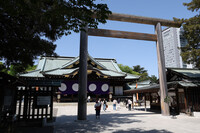80 Years On: Yasukuni Shrine Remains Political, Diplomatic Issue

Tokyo, Aug. 15 (Jiji Press)--Tokyo's war-related Yasukuni Shrine has been at the center of political and diplomatic discussions, particularly regarding visits by the sitting prime minister and other cabinet members on the anniversary of the end of World War II.
The Shinto shrine enshrines the souls of about 2.46 million people, including fallen soldiers and war criminals. After the war, it transformed from a symbol of the state-sponsored religion into a religious corporation.
Before the war, Yasukuni Shrine was jointly managed by the now-defunct army and navy ministries, acting as a spiritual pillar of militarism that bolstered public morale. Following Japan's surrender, the General Headquarters of the Allied Powers, also known as GHQ in Japan, issued an order to abolish state sponsorship of Shinto and prevent a resurgence of militarism. The shrine was then registered as a religious corporation in 1946.
However, the belief that the shrine should be treated specially remained strong among the Japanese public, prompting a national movement that advocated for state management and funding.
From 1969, the Liberal Democratic Party submitted five bills to make the shrine a special corporation under state management. However, the bills were scrapped by 1974, due to opposition from other parties and the shrine itself, which resisted changes that would diminish its religious character.
(2025/08/15-09:30)



 HOME
HOME JAPANESE
JAPANESE
 HOME
HOME (C)JIJI PRESS LTD., All rights reserved.
(C)JIJI PRESS LTD., All rights reserved.